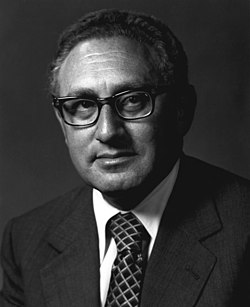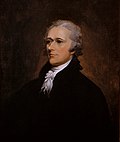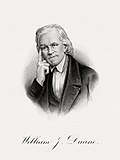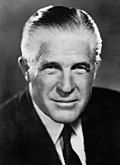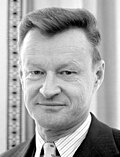As of 2023, [update] there have been 23 members appointed to the Cabinet of the United States who had been born outside the present-day United States.
Contents
- Permanent cabinet members
- Current departments
- Defunct departments
- Cabinet-level officials
- See also
- Notes
- References
Alexander Hamilton, one of the Founding Fathers who signed the U.S. Constitution, was the first cabinet member to be born outside of the United States. [1] President George Washington appointed Hamilton, born in Nevis in 1755 or in 1757, as the United States' first Secretary of the Treasury in 1789. [2] [3] Irish-born James McHenry, whom Washington appointed as Secretary of War in 1796 and who served in the same post in John Adams's administration, was the other foreign-born individual in Washington's cabinet. [4]
Albert Gallatin, born in the Republic of Geneva (in present-day Switzerland) in 1761, became the third foreign-born member of the cabinet when named Secretary of the Treasury by President Thomas Jefferson in 1801. [5] [6] Gallatin, his successor George W. Campbell, William J. Duane, Carl Schurz, and James Wilson were the only foreign-born members to hold cabinet positions in the 19th century. In the 20th century, nine foreign-born individuals were appointed to the cabinet, including German-born Oscar Straus and Mexican-born George Romney (George Romney, born to American parents, became the father of former Governor of Massachusetts, 2012 Republican U.S. presidential candidate and current U.S. Senator from Utah Mitt Romney. [7] [8] ) During the 2001 to 2009 presidency of President George W. Bush, three foreign-born individuals became members of his cabinet—Elaine Chao and Mel Martínez in 2001; Carlos Gutierrez in 2005. [1]
The Department of the Treasury has had the most foreign-born secretaries, with five. The Department of Labor and the Department of the Interior follow with three, and the Departments of Housing and Urban Development and State have each had two. Former Secretaries of State Henry Kissinger and Madeleine Albright were the highest-ranking foreign-born cabinet members ever in accordance to the United States presidential line of succession. [1] The majority of foreign-born cabinet members were born in Europe. Most European-born cabinet members originated from the United Kingdom and Germany (with five and four respectively), and the others were born in Ireland, Czechoslovakia, Switzerland, and Italy. Four cabinet members were born in the Americas, and one was born in Asia. The Departments of Defense, Justice, Health and Human Services, and Education have not had foreign-born secretaries.
Since most foreign-born cabinet members are not natural-born citizens—meaning that they were not born in the United States or born abroad to American parents—they are ineligible to exercise the powers of the President of the United States in the event that "neither a President nor Vice President" is able to "discharge the powers and duties" of the presidency as specified in the Presidential Succession Act of 1947. [9] [10] A notable exception was HUD Secretary George W. Romney, who was a birthright U.S. citizen because his parents were U.S. citizens and, in fact, had been a candidate in the Republican presidential primaries the prior year.
